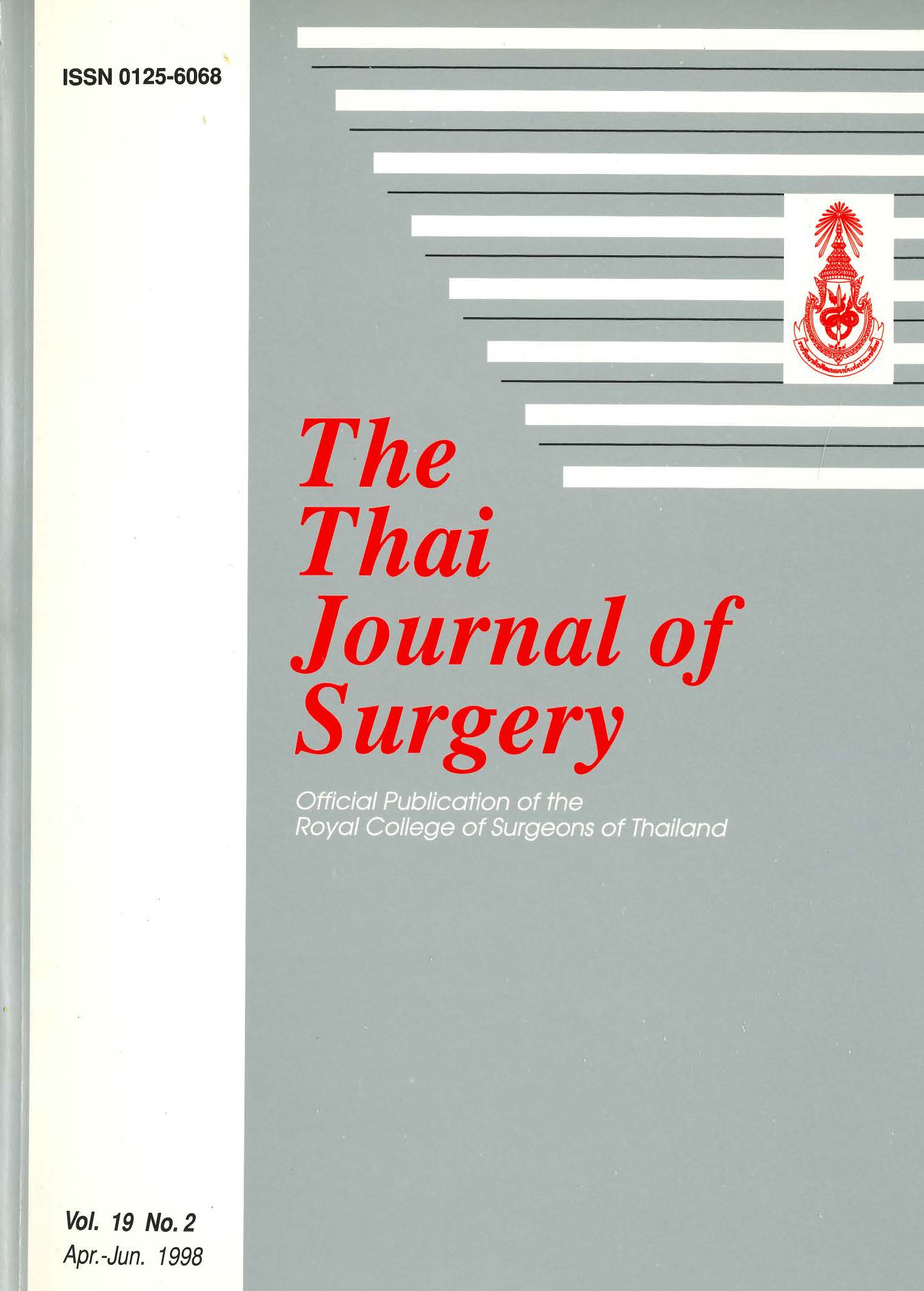Radical Resection with Nerve Preserving Surgery for Rectal Cancer: Preliminary Report
Abstract
Radical resection with nerve preserving surgery was performed for eradication of rectal cancer and regional lymph nodes both upward and lateral pathways in order to improve survival, decrease local recurrence, and also reduce genitourinary morbidity by preservation of pelvic autonomic nerves. From December 1 996 to February 1998, 17 patients were studied with average age 52.3 years (range 23-72 years). The average blood loss was 700 ml. and operative time was 281 minutes. Complications occurred in 7 patients and most of them resolved spontaneously, except one patient needed reoperation for anastomotic leakage by conversion to abdominoperineal resection. Urinary dysfunction occurred transiently in one patient and sexual potency was regained postoperatively in one of two patients who were sexually active preoperatively. There were no 30 days mortality and no local recurrence in 10.5 months of follow up period. This procedure appeared safe and yielded satisfactory functional preservation without adversed oncologic outcome.
References
2. McArdle CS, Hole D. Impact of variability among surgeons on post-operative morbidity and mortality and ultimate survival. Br Med J 1991; 302:1 501-5.
3. KrookJE, Moeltel CG, Gunderson LL, et al. Effective adjuvant therapy for high risk rectal carcinoma. N Engl J Med 1991; 324:709-15.
4. Moynihan B. The surgical treatment of cancer of the sigmoid colon and rectum, Surg Gynecol Obstet 1908; 6:463-6
5. Stearns MW Jr, Deddish MR. Five years results of abdominopelvic lymph node dissection for carcinoma of the rectum. Dis Colon Rectum 1969ะ 2:69-172.
6. Enker WE, Heilweil ML, Hertz RL, et al. En bloc pelvic lymphadenectomy and sphincter preservation on the surgical management of rectal cancer. Ann Surg 1986; 203:426-33.
7. Hojo K, Sawada T, Moriya Y. An analysis of voiding sexual function after wide iliopelvic lymphadenectomy in patients with adenocarcinoma of the rectum, compared with conventional lymphadenectomy. Dis Colon Rectum 1989;32:128-33.
8. Moriya Y, Hojo K, Sawada T, Koyama T. Significance of lateral node dissection for advanced rectal carcinoma at or below the peritoneal reflection. Dis Colon Rectum 1989:32:307-15.
9. Cohen AM, Minsky BD, Schilsky RL. Cancer of the colon. In Cancer. Principal and Practice of Oncology. In; deVita UT, Hellman S, Rosenberg SA, 5th eds. Philadelphia: Lippincott-Caven, 1997:1154-7.
10. Enker WE. Potency, cure, and local control in the operative treatment of rectal cancer. Arch Surg 1992; 127:1 396-402.
11. Moriya Y. Pelvic node dissection with autonomic nerve sparing for invasive lower rectal cancer: Japanese experience. In: Wanebo HJ. ed. Colorectal Cancer. St. Louis, Missouri: Mosby, 1993:274-49.
12. Sauer I, Bacon HE, Influence of lateral spread of cancer of the rectum on radicability of operation and prognosis. Am J Surg 1951;21:728-32.
13. Hojo K, Koyama Y, Moriya Y. Lymphatic spread and its prognostic value on patients with rectal cancer. Am J Surg 1982; 144:350-4.
14. Michellasi F, Block GE. Morbidity and mortality of wide pelvic lymphadenectomy for rectal adenocarcinoma. Dis Colon Rectum 1992: 35:1143-7,
15. Pollar Cw, Nivatwongs S, Rojanasakul A, IIstrup DM. Carcinoma of the rectum. Profiles of the imtraoperative and early postoperative complication. Dis Colon Rectum 1994;37:866-74.
16. Enker WE, Thaler MT, Cranor ML, et al. Total mesorectal excision in the operative treatment of the rectum. J Am Coll Surg 1995; 181:335-46,
17. Maas CP, Moriya Y, Steup WH, et al. Radical and nerve-preserving surgery for rectal cancer in the Netherlands: a prospective study on morbidity and functional outcome. Br J Surg 1988; 85:92-7.
18. MoriyaY, Sugihara K, Akusu T, et al. Importance of extended lymphadenectomy with lateral node dissection for advanced lower rectal cancer. World J Surg 1997; 21:728-32.
19. Boley L, Veidenheimer MC, Coller JA, Corman ML. Mortality, morbidity and pattern of recurrence after abdominoperineal resection for cancer of the rectum. Dis Colon Rectum 1982: 25:202-8.
20. Karanjia D, Corder AP, Bearn P, et al. Leakage from stapled lower anastomasis after total mesorectal excision for carcinoma of rectum. Br J Surg 1994; 81:1224-6.
21. Fowler JW, Bremmer DN, Moflat LEF. The incidence and consequence of damage to the parasympathetic nerve supply to the bladder after abdominoperineal resection of the rectum for carcinoma. Br J Urol 1978; 50:95-8.
22. Leveckis L, Boucher NR, Parys BT, et al. Bladder and erectile dysfunction before and after surgery for rectal cancer. Br J Urol 1995; 76:752-6.
23. Kinn AC, Ohman U. Bladder and sexual function after surgery for rectal cancer, Dis Colon Rectum 1986; 29:43-8.
24. Cunsolo A, Bragaglia RB, Manara G, et al. Urogenital dysfunction after abdominoperineal resection for carcinoma of the rectum, Dis Colon Rectum 1990; 3:918-22.
25. Koyama Y, Moriya Y, Hojo K, Effects of extended systemic lymphadenectomy for adenocarcinoma of the rectum-significant improvement of survival rate and decrease of local recurrence. Jpn J Clin Oncol 1984; 14:623-32.
26. Glass R, Ritchie J, Thompson M, et al, The results of surgical treatment of cancer of the rectum by radical resection and extended abdominiliac lymphadenectomy. Br J Surg 1985;72:599-601.
Downloads
Published
How to Cite
Issue
Section
License
Articles must be contributed solely to The Thai Journal of Surgery and when published become the property of the Royal College of Surgeons of Thailand. The Royal College of Surgeons of Thailand reserves copyright on all published materials and such materials may not be reproduced in any form without the written permission.



